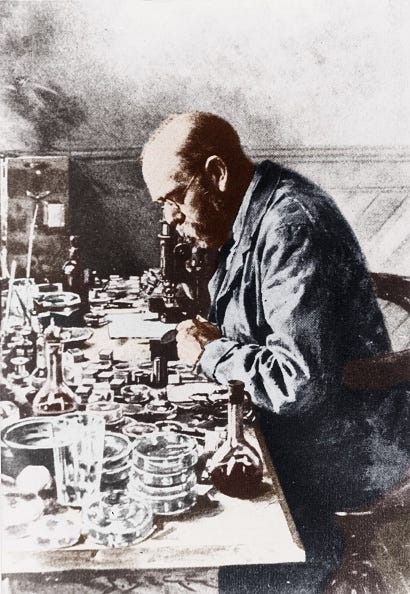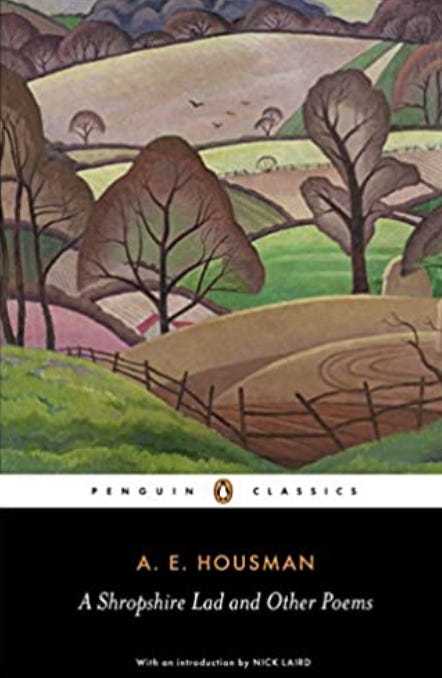A Shropshire Lad, II (Loveliest of trees, the cherry now) by A. E. Housman. Public Domain.
ORIGINAL TEXT AND AUDIO - 2017
It was on this day in 1882, German doctor and early microbiologist Robert Koch announced that he had found the bacterium responsible for tuberculosis.
Historically, tuberculosis has been one of the world’s most dangerous diseases. At the time of Koch’s discovery, one in seven people died of it. For many years, tuberculosis was believed to be an inherited condition. Koch, however, strongly believed that it was a contagious illness spread by a pathogen. Koch’s previous work had already identified the bacteria responsible for cholera and anthrax poisoning, respectively. This work had also led him to create four “postulates” of criteria for linking a specific bacterium to an infectious disease.
Koch worked on guinea pigs to fulfill his four postulates and eventually isolated the cause of tuberculosis as Mycobacterium tuberculosis. He delivered his results to a crowd of scientists in a lecture hall. He brought his entire laboratory to the room to replicate his method on the spot, and the room was left stunned by his work. At the end, there were no questions; instead, the scientists lined up to see the bacteria for themselves through the microscope. Paul Erlich, a future Nobel Prize winner in chemistry, called the lecture “the most important experience of my scientific life.”
Koch himself was awarded the Nobel Prize, in Physiology or Medicine, in 1905 for his work with tuberculosis. Today, thanks to antibiotic treatment, the disease’s death rate hovers at a much smaller 4 percent.
It’s the birthday of American poet and painter Lawrence Ferlinghetti, born in Bronxville, New York (1919). His mother was French and his father worked as an auctioneer in Little Italy. He died when Ferlinghetti was six months old and his mother was committed to an asylum shortly after. Ferlinghetti’s aunt whisked him to France, where he grew up with French as his first language.
He served as a Navy Lieutenant Commander during World War II. After the bombing of Nagasaki, he toured the city. The devastation turned him into a pacifist for life and he even wrote a poem titled “Tentative Description of a Dinner Given to Promote the Impeachment of President Eisenhower,” a rebuke about the dangers of nuclear war.
Ferlinghetti is best known for his association during the 1950s with a wild group of artists and poets known as the Beats. They included poet Allen Ginsberg and novelist Jack Kerouac, who wrote On the Road, the classic coming-of-age, cross-country road novel. It was Ferlinghetti who first published Ginsberg’s incendiary book Howl and Other Poems (1956), after hearing the poet read the title poem at the Six Gallery in North Beach, California. Ferlinghetti owned the City Lights Bookstore in San Francisco, and the day after hearing Ginsberg read, he sent him a telegram. It said, “I GREET YOU AT THE BEGINNING OF A GREAT CAREER. STOP. WHEN DO I GET MANUSCRIPT OF HOWL?” The book was published by Ferlinghetti’s Pocket Poets series. The books were compact enough to fit in your purse or back pocket. Though Ferlinghetti was a big champion of Ginsberg’s, and the Beats, he once said, “Generally, dirty words divert attention from what you’re trying to get across.” He published Ginsberg’s work for the next 30 years.
It was in San Francisco in the early 1950s that he decided to open a bookstore of his own, the City Lights Bookstore. Lawrence Ferlinghetti’s books include Pictures of the Gone World (1955), A Far Rockaway of the Heart (1998), Time of Useful Consciousness (2012), and A Coney Island of the Mind (1958), which has sold more than a million copies around the world.
It’s the birthday of British journalist and social critic Malcolm Muggeridge, born in Croydon, Surrey (1903). He became the editor of the British humor magazine Punch, in 1953, when the staff broke its tradition of hiring from within their own staff and chose to hire Muggeridge instead. The magazine acquired a very satirical bite while he was in charge because of his strong editorials, and because he even sometimes parodied the typesetting and styles of other journals to make fun of them.
Under Malcolm Muggeridge, Punch also became a literary magazine, featuring some of England’s best writers while he was in charge. Muggeridge eventually left after he got tired of his staff, which he referred to as “all anguished men” who were “trying to discover what, if anything, was funny.”
He said: “It was a somber place, haunted by old jokes and lost laughter. Life, as I discovered, holds no more wretched occupation than trying to make the English laugh.”






Hi
Small correction to todays TWA
The Six Gallery is not in North Beach.
https://en.m.wikipedia.org/wiki/Six_Gallery_reading
Your post is dated 2017! Maybe this is a reprint, and you left the original posting date on purpose?